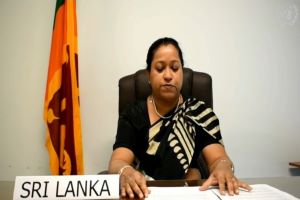
UN Human Rights Council Social Forum 2020
The role of the state and public policies to address poverty and inequalities
09 October 2020
Statement by Sri Lanka
Mr. Co-Chair,
At the outset, Sri Lanka wishes to congratulate the distinguished Permanent Representatives of Azerbaijan and Mongolia who serve as co-chair rapporteurs of the 2020 Social Forum, an annual engagement of this Council to which my country attaches great importance.
As a country whose post-independence national policies have been premised exclusively on the wellbeing of its people, the role of the state and the public policies of Sri Lanka have for long years been oriented in the trajectory of addressing poverty and inequalities among its population.
These people-friendly state policies have largely been characterised by continuous nationwide poverty alleviation programmes that successfully brought down the country’s national poverty headcount ratio from 15.3% in 2006/07 to 4.1% in 2016, relegating extreme poverty to a rare phenomenon among Sri Lankans.
The other equally significant feature of Sri Lanka’s efforts at reducing inequalities has been its long history of consistent investments in health, education and other public services, that has helped the country achieve socio-economic standards and advanced human capital on par with many middle income economies.
These progressive state policies have continued to contribute to the country’s commendable progress with regard to human development, with Sri Lanka ranking the highest in South Asia according to the UN Human Development Report 2019.
Sri Lanka is committed to achieving the Sustainable Development Goals of the UN. Based on the vision of President Gotabaya Rajapaksa’s policy statement “Vistas of Prosperity and Splendour”, a Presidential Task Force in charge of Economic Revival and Poverty Eradication has been established to create a production economy, focusing on a unique economic structure based on novel initiatives. Bold and creative initiatives are being taken to reduce poverty by targeting poor families and providing at least one member of each such family wage employment.
Mr. Co-chair,
As the COVID-19 pandemic continues to strike, we are continuously reminded of the stark inequalities that exist in our global landscape, which are often exacerbated by the effects of the pandemic.
In this regard, Sri Lanka notes with deep concern the unprecedented economic and debt crisis faced by developing countries due to the pandemic, and would like to ask the distinguished panellists on how the international community could better cooperate to support States in providing debt relief and financial stimulus to overcome the negative effects of the pandemic.